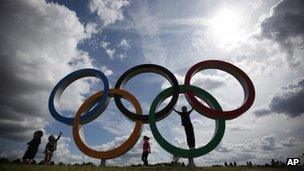New rules on school playing space criticised
- Published
- comments

A debate is growing on sport in Britain's schools following the London Olympics
Critics are warning that new rules on outdoor space for pupils in England to do PE will make it easier for schools to sell off playing fields.
Secondary schools in England previously had to provide pitches ranging from 5,000 sq m to 54,000 sq m, depending on the number of pupils.
But schools must now provide only "suitable outdoor space" for pupils.
The Department for Education insisted its "extremely strict rules" on playing fields were still in place.
Officials say the change in regulations relates to "outdoor space" - not playing fields.
The criteria for agreeing a sale of playing fields for development includes ensuring that there are enough remaining fields for local schools and communities and that sale proceeds are re-invested, preferably in outdoor sport facilities.
The news of the change in rules comes amid a debate about how best to build on the legacy of the London Olympics following the success of Team GB, who had their best medal haul since 1908.
Labour has said it will call a vote on the issue when MPs return to Parliament in September.
'Jeopardise future'
Tim Lamb, the chief executive of the Sport and Recreation Alliance, an umbrella organisation for sports bodies, told the Guardian, external the change undermined future provision of sport.
"Without a minimum requirement, the danger is that short-term expediency could jeopardise the ability of schools to deliver sport for future generations," he said.
"We're confident that the Education Funding Agency understands the need to require schools to retain a minimum playing field space because the previous requirements were one of the key tools for preventing the sale of land."
The government disputed Mr Lamb's claims.
The new regulations were laid in Parliament last month but have only just come to light.
The DfE said that in the next 12 months it would publish guidance with a formula setting out the minimum outside space schools would have to provide - although it had yet to consult on it.
'Firmly in place'
A spokesman said: "These regulations set out for the first time that all schools must have access to suitable outdoor space for both formal PE lessons and for outdoor play.
"By removing pages and pages of bureaucratic restrictions we will make it easier and cheaper to provide the extra school places that this country needs so urgently.
"Our extremely strict rules on playing fields will stay firmly in place. This government has only approved sales if the school has closed, has merged or if equal or better facilities are being put in their place.
"We will be consulting later this year on how the new guidelines should be implemented."
An estimated 10,000 playing fields were disposed of between 1979 and 1997 when the Conservatives were in power.
Figures from the DfE also show 213 playing fields were approved for sale between 1999 and April 2010, under the last Labour government.
Shadow education secretary Stephen Twigg said Mr Gove was "weakening the standards Labour introduced to protect school playing fields".
"Parents want reassurances that these changes won't allow more to be sold off," he said.
"If we are to ensure the Olympic legacy, the government must ensure that schools provide a decent amount of space for competitive sports and play."
He also pointed out that the government had scrapped a target for state schools to provide at least two hours of PE a week.
The government was also criticised earlier this month when it was revealed the education secretary had approved the sale of 21 school sports fields in the past two years.
But the DfE later said that 14 of the fields were at schools that had closed, four were sites that became surplus when existing schools amalgamated and one was surplus marginal grassland on the school site, with the proceeds invested in the school library and better sports changing facilities.
- Published8 August 2012
- Published8 August 2012
- Published7 August 2012